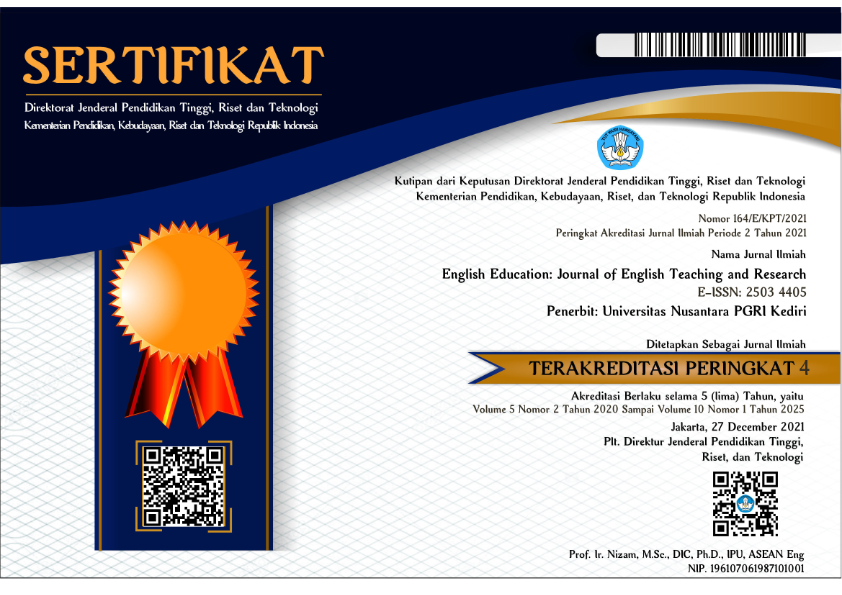Reflective Teaching as a Tool for Teacher Professional Development
DOI:
https://doi.org/10.29407/jetar.v6i2.16526Keywords:
reflective teaching, teacher profesionalism, english language teachingAbstract
Reflection has long been known as an important component for teacher professional development, and it has been widely researched. However, little is known about how teachers reflect on their teaching. Aiming at finding out how in-service English as a foreign language (EFL) teachers reflect on their teaching activities and how their self-reflection impacts their professionalism, the current study employs a qualitative case study as its research design. It involved six in-service EFL teachers at various levels of education, such as kindergarten, elementary, junior, and senior high schools, who were taking the postgraduate program in English Education at FKIP Universitas Tanjungpura as the research participants. The data for this study were obtained through questionnaires and interviews, as well as the written analysis of participants' teaching videos. After being analyzed qualitatively, the findings of this study indicate that most respondents reflect on their teaching activities at a very basic level. In relation to the impact of their reflective teaching on their professionalism, however, overall, respondents thought that their reflection activities helped them know their weaknesses and strengths in teaching, which encouraged them to become better teachers.
Downloads
References
Ahmad, I., Said, H. B., Zeb, A., Rehman, S. ur, Ahmad, S., & Khan, W. (2013). How reflective practice improves teachers’ classroom teaching skill? Case of community based schools in district Chitral, Khyber Pakhtunkhwa. Academic Research International, 4(1), 73–81.
Disu, A. (2017). A Phenomenological Study on Reflective Teaching Practice [Dissertation]. Concordia University.
Fakazli, Ö., & KuruGönen, S. İ. (2017). Reflection of reflection: EFL University instructor’s perceptions on reflective practices. H.U Journal of Education, 32(3), 708–726.
Jay, J. K., & Johnson, K. L. (2002). Capturing complexity: A typology of reflective practice for teacher education. Teaching and Teacher Education, 18, 73–85.
Lamb, J. (2017). How do teachers reflect on their practice? A study into how feedback influences teachers’ reflective practice. The STeP Journal, 4(4), 94–104.
Levis, J., & Farrell, T. S. C. (2007). Failing the practicum: Narrowing the gap between expectations and reality with reflective practice. TESOL Quarterly, 41, 193–201. https://doi.org/10.1002/j.1545-7249.2007.tb00049.x
Lubis, A. H. (2017). Teaching reflection: A voice from Indonesian EFL teachers. International Journal of English Language Teaching and Linguistics, 2(1), 29–39.
Lubis, A. H. (2018). Reflective teaching toward EFL teachers' professional autonomy: Revisiting its development in Indonesia. International Journal of Education, 11(1), 35–49.
Manen, M. van. (1995). On the epistemology of reflective practice. Teachers and Teaching: Theory and Practice, 1(1), 33–50.
Moradkhani, S. (2019). EFL teachers’ perceptions of two reflection approaches. ELT Journal, 73(1), 61–71. https://doi.org/10.1093/elt/ccy030
Moradkhani, S., & Shirazizadeh, M. (2017). Context-based variations in EFL teachers’ reflection: The case of public schools versus private institutes in Iran. Reflective Practice, 18(2), 206–218. https://doi.org/10.1080/14623943.2016.1267002
Nguyen, C. D. (2017). Connections between learning and teaching: EFL teachers’ reflective practice. Pedagogies: An International Journal, 12(3), 237–255. https://doi.org/10.1080/1554480X.2017.1356725
Sunra, L., Haryanto, & Sahril, N. (2020). Teachers’ reflective practice and challenges in an Indonesian EFL secondary school classroom. International Journal of Language Education, 289–300. https://doi.org/10.26858/ijole.v4i2.13893
Tosriadi, T., Asib, A., Marmanto, S., & Azizah, U. (2018). In-service EFL teachers’ experiences of conducting reflective practice as continuing professional development. International Journal of Language Education, 52–64. https://doi.org/10.26858/ijole.v2i2.6208
Uştuk, Ö., & De Costa, P. I. (2021). Reflection as meta‐action: Lesson study and EFL teacher professional development. TESOL Journal, 12(1), 1–16. https://doi.org/10.1002/tesj.531
Yost, D. S., Sentner, S. M., & Forlenza-Bailey, A. (2000). An examination of the construct of critical reflection: Implications for teacher education programming in the 21st century. Journal of Teacher Education, 51(1), 39–49.
Downloads
Published
Issue
Section
License
Authors who publish with this journal agree to the following terms:
- Copyright on any article is retained by the author(s).
- The author grants the journal, the right of first publication with the work simultaneously licensed under a Creative Commons Attribution License that allows others to share the work with an acknowledgment of the work’s authorship and initial publication in this journal.
- Authors are able to enter into separate, additional contractual arrangements for the non-exclusive distribution of the journal’s published version of the work (e.g., post it to an institutional repository or publish it in a book), with an acknowledgment of its initial publication in this journal.
- Authors are permitted and encouraged to post their work online (e.g., in institutional repositories or on their website) prior to and during the submission process, as it can lead to productive exchanges, as well as earlier and greater citation of published work.
- The article and any associated published material is distributed under the Creative Commons Attribution-ShareAlike 4.0 International License








 Article template
Article template



